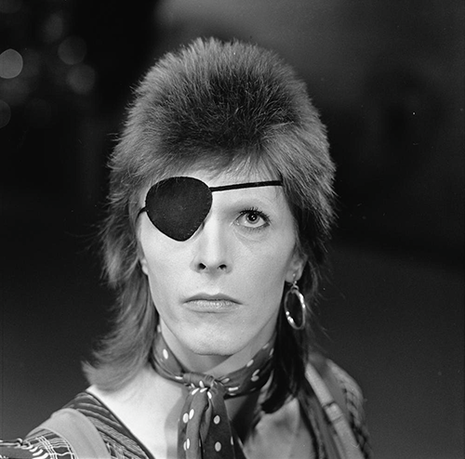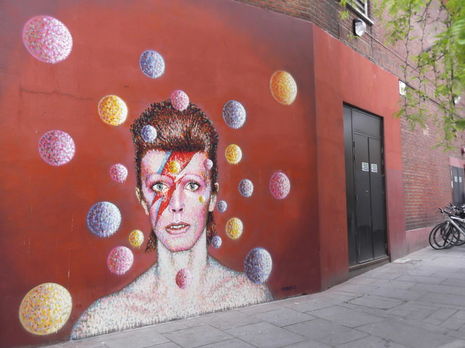Lazarus: a fond farewell to David Bowie
Theatre’s staff writer, Margaux Emmanuel, reviews Lazarus – a musical of epic, existential proportions, and David Bowie’s last project before his untimely death in January 2016.

I’ll be the first to admit that I’m a huge David Bowie fan. Bowie’s music goes beyond the melody – he’s not just a rock icon, but an artist of unparalleled cultural influence. His entire personage resonates with creative freedom. It goes without saying that I was excited for the streaming of Bowie’s final project – the Lazarus musical, written with Enda Walsh and directed by Ivo van Hove – but the final product left me in the end with mixed feelings. I was as mesmerized as I was bewildered.
On January 8, 2021, Bowie would have turned 74. Two days later, it was the five-year anniversary of Bowie’s death. To commemorate this, the 2016 streaming of the show directed by Ivo van Hove was uploaded on dice.fm, offering the opportunity to discover Bowie’s last offering of creativity. This streaming was an opportunity to re-discover Bowie, his last album ‘Black Star’ still haunting us, interpreted as the farewell from a terminally ill man. Lazarus, can be considered the continuation of the story of Thomas Newton, played by Bowie in Nicolas Roeg’s adaptation of Walter Tevis’ novel The Man Who Fell to Earth. Lazarus first began at the East Village’s New York Theatre Workshop in November 2015, opening on December 7. A month later, the world learned that David Bowie had died. Yet many Bowie fans, like myself, had never even heard of this musical.
The first obstacle that I am confronted with is that it is seemingly impossible to characterize what the narrative arc of this musical was. There is something deeply fractured about the bloody scenes clumsily interspersed with humour, as well as the pell-mell of various narratives of Lazarus. The incoherency is almost bothersome.

Yet I also wonder if this was deliberate, because it would be disappointing for Bowie’s last work to be… normal. If you are expecting to watch this play for light-hearted entertainment with famous rock songs, Lazarus might not be for you. The soundscape of this musical, created with both songs from final albums, as well as three new tracks, presented us with music that was agreeably familiar, yet reconfigured.
Nevertheless, this musical was most definitely (and literally) an out-of-this world experience, dipping into the fractured psyche of Thomas Newton, played by Michael C. Hall. His portrayal of a man destroyed by regret, disillusioned, and delusional was superbly compelling. The entire world of Lazarus is centered around Newton’s disengaged, drunken world. Intoxication is literally at the center of the stage, as symbolized by the bottle of gin that Thomas Newton often reaches for. Around Newton revolve alter-egos, which are very characteristic of Bowie’s oeuvre.
“The entire musical becomes a powerful representation of the liminal space between death and life”
The haunting and profoundly tormented character Valentine, played by Michael Esper, was also truly spine chilling. The exquisite lighting and design by Jan Versweyveld also contributed to this eerie, psychedelic ambiance. Although there is a strong other-worldly quality to Lazarus, the most touching aspect of the musical was the autobiographical dimension of it; the audience can see that this was a dying Bowie’s farewell, as the play explores the theme of mortality. This sense of loss and initial disorientation resonates strongly with the first song Lazarus’ – setting the tone for the entire performance. In this respect, the entire musical becomes a powerful representation of the liminal space between death and life, and of the oscillation between insanity and sanity, as well as an exploration of identity. Another strong point of this musical was the character Elly who I found particularly interesting, played by Cristin Milioti. The performance of “Changes” was particularly cathartic and captivating.
All in all, Lazarus is not the typical theatrical experience, and remains a must-see work for the Bowie connoisseur. We discover a Bowie “trying to turn (...) old words into something new”, in limbo between dream, life and death. Some of Newton’s last words “When do you think I can leave? It has to be soon” really hit home, when he states how he will now have to “step off the earth” and leave for another planet. The touching final performance of ‘Heroes’, soft and broken, shows that David Robert Jones might have left us, but David Bowie will never die.
★★★☆☆
 News / Report suggests Cambridge the hardest place to get a first in the country23 January 2026
News / Report suggests Cambridge the hardest place to get a first in the country23 January 2026 News / Students condemn ‘insidious’ Israel trip23 January 2026
News / Students condemn ‘insidious’ Israel trip23 January 2026 News / Cambridge ranks in the top ten for every subject area in 202623 January 2026
News / Cambridge ranks in the top ten for every subject area in 202623 January 2026 News / Uni denounced for bypassing ‘democratic structures’23 January 2026
News / Uni denounced for bypassing ‘democratic structures’23 January 2026 Comment / Cambridge has already become complacent on class23 January 2026
Comment / Cambridge has already become complacent on class23 January 2026









